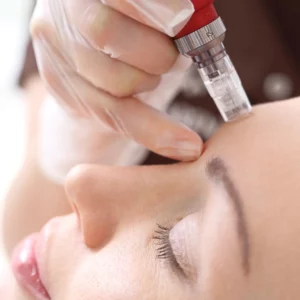Living with Polycystic Ovary Syndrome (PCOS) comes with its own set of challenges, and one of the often overlooked aspects is skin discoloration. Many individuals with PCOS experience changes in pigmentation, leading to uneven skin tone and dark patches. In this blog, we’ll explore the causes of skin discoloration in PCOS and delve into effective PCOS skin discoloration treatment options and lifestyle changes to help you achieve a radiant and even complexion.
Contents
Does PCOS Cause Skin Discoloration?

Polycystic Ovary Syndrome (PCOS) itself is not directly responsible for causing skin discoloration. However, there are indirect ways in which PCOS can contribute to changes in skin pigmentation. PCOS is a hormonal disorder that involves an imbalance in sex hormones, particularly increased levels of androgens (such as testosterone) about estrogen. These hormonal imbalances can trigger certain skin issues that may lead to discoloration.
Here are some ways in which PCOS can be associated with skin changes:
- Acanthosis Nigricans: This is a skin condition characterized by dark, velvety patches that often develop in body folds and creases. Acanthosis nigricans is associated with insulin resistance, which is a common feature in individuals with PCOS. The darkening of the skin occurs due to the elevated levels of insulin, which can stimulate the growth of skin cells and increase melanin production.
- Hyperpigmentation: Hormonal imbalances in PCOS, particularly elevated androgen levels, can stimulate the overproduction of melanin, the pigment responsible for skin color. This can lead to hyperpigmentation, where certain areas of the skin become darker than the surrounding skin.
- Skin Tags: PCOS is also linked to the development of skin tags, which are small, benign growths that can appear in areas where the skin rubs together. While skin tags themselves may not cause discoloration, their presence may be associated with other skin changes.
It’s important to note that skin discoloration can have various causes, and not everyone with PCOS will experience these issues. If you are experiencing changes in your skin and suspect it may be related to PCOS, it’s advisable to consult with a healthcare professional or dermatologist.
What Is The Best PCOS Skin Discoloration Treatment?
Professional PCOS skin discoloration treatment options can vary depending on the specific concerns and the severity of the condition. Here are some professional options commonly considered for treating skin discoloration associated with PCOS:
Topical Treatments
Professional topical treatments prescribed by dermatologists are often a key component in addressing PCOS-related skin discoloration. Hydroquinone is a commonly used ingredient known for its skin-lightening properties. It works by inhibiting melanin production, helping to fade dark patches. Tretinoin, a derivative of vitamin A, promotes cell turnover, aiding in the removal of hyperpigmented skin cells. Corticosteroids may also be included to reduce inflammation and further contribute to an even skin tone.
Chemical Peels
Chemical peels involve the application of acid solutions to the skin, creating controlled damage to the outer layers. Alpha Hydroxy Acids (AHAs) like glycolic acid and Beta Hydroxy Acids (BHAs) such as salicylic acid are common choices. By exfoliating the skin, chemical peels help remove damaged, pigmented cells, revealing fresher, more evenly toned skin beneath. The depth and type of peel are determined by the dermatologist based on the severity of the pigmentation. Multiple sessions may be required to achieve optimal results.
Laser Therapy
Intense Pulsed Light (IPL) therapy is a non-invasive treatment that uses light energy to target and break down excess melanin in the skin. This process can be effective in reducing hyperpigmentation caused by conditions like PCOS. IPL treatments are typically well-tolerated and require minimal downtime. However, the number of sessions needed may vary depending on the extent of the pigmentation and individual response to the treatment.
Microneedling
 Microneedling, or collagen induction therapy, involves the use of tiny needles to create controlled micro-injuries in the skin. This process stimulates the body’s natural collagen production, promoting skin renewal and improvement in texture. Microneedling can be effective in addressing hyperpigmentation associated with PCOS. It not only targets pigmented areas but also enhances overall skin health. The procedure is generally safe when performed by a trained professional, and results become more apparent with a series of sessions spaced over time.
Microneedling, or collagen induction therapy, involves the use of tiny needles to create controlled micro-injuries in the skin. This process stimulates the body’s natural collagen production, promoting skin renewal and improvement in texture. Microneedling can be effective in addressing hyperpigmentation associated with PCOS. It not only targets pigmented areas but also enhances overall skin health. The procedure is generally safe when performed by a trained professional, and results become more apparent with a series of sessions spaced over time.
Fractional Laser Resurfacing
Fractional laser resurfacing is a more advanced laser treatment that targets specific areas of the skin, creating microscopic injuries. This process stimulates collagen production and triggers the body’s natural healing response. Fractional lasers can effectively treat hyperpigmentation associated with PCOS by promoting the growth of new, healthier skin. The procedure is precise, allowing for controlled treatment of the affected areas, and downtime is typically shorter compared to traditional laser resurfacing.
Dermabrasion
Dermabrasion is a mechanical exfoliation technique that involves removing the top layers of skin using a rotating brush or diamond wheel. This procedure is effective in reducing hyperpigmentation and improving overall skin texture. Dermabrasion is often used for more severe skin issues, and the depth of treatment can be adjusted based on the extent of pigmentation. While the recovery period may be longer compared to some other treatments, the results can be significant, providing a smoother and more even complexion.
Cryotherapy
Cryotherapy involves freezing and removing abnormal or pigmented skin cells. This treatment is often used for specific types of skin discoloration and lesions. During cryotherapy, a freezing agent like liquid nitrogen is applied to the targeted areas, causing the cells to freeze and eventually peel off. Cryotherapy can be effective in treating localized areas of hyperpigmentation. However, it’s important to note that the procedure may cause temporary redness and swelling, and multiple sessions may be required for optimal results.
Combination Therapies
In some cases, dermatologists may recommend a combination of treatments to address PCOS-related skin discoloration comprehensively. For example, a dermatologist might suggest combining topical treatments with laser therapy or chemical peels to target different aspects of hyperpigmentation. This personalized approach aims to maximize results while minimizing potential side effects. The combination of therapies may be tailored to the individual’s skin type, the severity of pigmentation, and other specific factors.
Follow-up Care and Maintenance
After undergoing professional treatments for PCOS-related skin discoloration, follow-up care is crucial for maintaining results and ensuring the ongoing health of the skin. Dermatologists may recommend specific skincare routines, including gentle cleansers, moisturizers, and sunscreen to protect the skin from further damage. Regular check-ups and assessments allow healthcare professionals to monitor progress and make adjustments to the treatment plan if necessary.
It’s important to emphasize that the choice of professional PCOS skin discoloration treatment should be made in consultation with a qualified dermatologist or healthcare professional. Each person’s response to these treatments can vary. Thus, the guidance of a professional ensures a safe and effective approach to addressing PCOS-related skin discoloration.
How Can I Clear My Skin From PCOS?
 Clearing your skin from PCOS-related issues involves a combination of self-care practices, a healthy lifestyle, and a well-rounded skincare routine. While it’s important to note that individual responses may vary, here are some self-care tips that may help improve your skin health when living with PCOS:
Clearing your skin from PCOS-related issues involves a combination of self-care practices, a healthy lifestyle, and a well-rounded skincare routine. While it’s important to note that individual responses may vary, here are some self-care tips that may help improve your skin health when living with PCOS:
- Adopt a Balanced Diet
Incorporate a balanced and nutritious diet that includes plenty of fruits, vegetables, whole grains, and lean proteins. Foods rich in antioxidants, such as berries and leafy greens, can support overall skin health. Additionally, managing carbohydrate intake may help address insulin resistance, a common factor in PCOS.
- Stay Hydrated
Drink an adequate amount of water daily to keep your skin hydrated. Proper hydration supports skin elasticity and can contribute to a more vibrant complexion. Aim for at least 8 glasses (64 ounces) of water per day.
- Manage Insulin Levels
PCOS is often associated with insulin resistance. Consider incorporating foods with a low glycemic index, such as whole grains and legumes, to help regulate blood sugar levels. Regular exercise can also improve insulin sensitivity.
- Skincare Routine
Establish a consistent skincare routine that includes gentle cleansing, moisturizing, and sun protection. Use non-comedogenic products to avoid clogging pores. Consider incorporating ingredients like niacinamide or vitamin C, known for their skin-brightening properties.
- Sun Protection
Protect your skin from harmful UV rays by using a broad-spectrum sunscreen with at least SPF 30. Sun exposure can worsen hyperpigmentation, so consistent sun protection is crucial.
- Regular Exercise
Engage in regular physical activity to help manage weight, improve insulin sensitivity, and promote overall well-being. Exercise also enhances blood circulation, which can contribute to healthier skin.
- Adequate Sleep
Prioritize quality sleep to support your body’s natural healing processes. Lack of sleep can contribute to increased stress levels and may impact skin health.
- Limit Dairy and Processed Foods
 Some individuals with PCOS find that reducing dairy and processed food intake can be beneficial for their skin. Experiment with your diet and monitor how your skin responds to different food choices.
Some individuals with PCOS find that reducing dairy and processed food intake can be beneficial for their skin. Experiment with your diet and monitor how your skin responds to different food choices.
Remember that it may take time to see noticeable improvements, and consistency is key. If you have specific concerns or conditions related to your skin and PCOS, it’s advisable to consult with healthcare professionals for personalized guidance and treatment recommendations.
Conclusion
In conclusion, achieving clearer skin with PCOS skin discoloration treatment involves a holistic approach that combines self-care practices and professional guidance. Understanding the underlying factors like hormonal imbalances and insulin resistance is crucial. Embracing a balanced diet, staying hydrated, and managing stress are essential self-care steps. A consistent skincare routine, sun protection, and lifestyle adjustments, such as regular exercise and adequate sleep, contribute to overall skin health.
Professional treatments like topical creams, chemical peels, and laser therapies can provide targeted solutions. Remember, every individual is unique. So consulting with healthcare professionals ensures a tailored plan for managing PCOS-related skin concerns and promoting a healthier, more radiant complexion. If you are facing PCOS-related issues, PCOS treatment at HerMantra can help. Book your free trial online pcos treatment session now.


